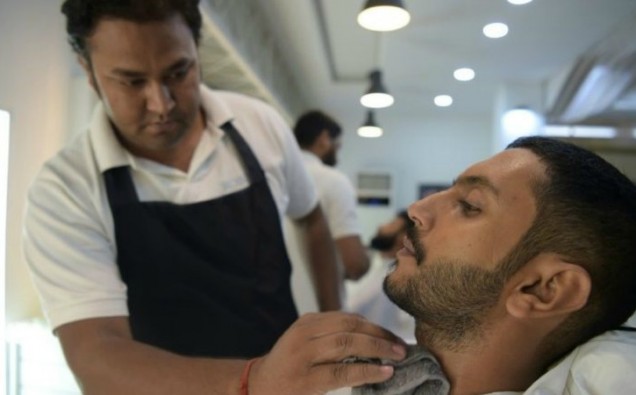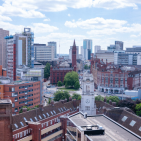Deeply conservative Pakistan has long had a strict philosophy regarding the masculinity of males, who are often expected to be austere with flamboyant styling to be avoided. Business savvy Entrepreneurs operating in urban centres have latched on to a new metro-sexual trend. Male beauty parlours.
While women in urban Pakistan have long enjoyed access to the care of beauticians and stylists, expensive facials and mani-pedis for men are becoming more common as disposable incomes in the nation’s swelling middle class grow – per capita income jumped by 6.4 percent in 2017. Men are now undergoing a similar beauty regime with nails being buffed, blackheads scrubbed and coffee sipped to the sound of clipping scissors inside the “Men’s” salon in Pakistan’s capital Islamabad.
Pakistan is a deeply conservative country with strict Islamic rules often governing lifestyle and beauty. However, due to Western influences via a vibrant social media culture has fuelled the desire to be selfie-ready at any time, with influencers like Adnan Malik and Osman Khalid Butt attracting hundreds of thousands of followers online with their fashion-conscious posts. Bollywood entertainment has long too driven fashion trends for conscientious groomers.
At Tauseeq Haider’s “Men’s” salon, customers usually fork out a minimum of 1,400 rupees (US$12.60) for a visit – a far cry from the 200 rupees spent at traditional barber shops.
“Men have equal right to be groomed and times have changed. It’s no more just getting your haircut,” says Haider.”Senior citizens, bureaucrats, they don’t feel ashamed of saying that I need a facial, massage, my nails need to be done, please suggest what should I get,” he adds.
In rural Pakistan, men have traditionally taken their fashion tips from Islamic dictates, with the Koran specifying the length of beard and moustache along with hygiene guidelines. However, times are rapidly evolving in the developing South Asian nation, with social media setting and wrecking trends in urban centres at the speed of a swipe.
According to Lebanese salon owner Michael Kanaan, who has been based in Pakistan for more than a decade, rising wages and greater exposure to global culture is fanning the burgeoning demand. “The Pakistan male is becoming more metrosexual. It is all due to the internet and the age of satellites and TVs,” says Kanaan.
Economist Minhajul Haque agrees, saying Pakistani men are also subjected to a new slew of online advertising campaigns that have reinforced the trend.
“There is this whole lot of clever marketing of male beauty products which is spurring demand,” he explains.
Humayun Khan, 49, says he is fine with spending more money to look good and his wife is supportive of the new passion.
“I… get my nails done, get my haircut, get my facial and I am done for the day and after two weeks I come again,” he says.
“If I don’t look good, my wife wouldn’t like me,” he laughs.
Stylist Ghulfam Ghori says Pakistani men are also now more concerned with skincare, opting for blackhead removal, acne treatments and even the occasional brush with makeup before major events like weddings.
“Men are very conscious about their skin now… and consider it essential to get facials. Previously it was not common, but now the trend is increasing among men to get themselves groomed,” says Ghori. It’s not just the salons that are cashing in on Pakistani men’s blossoming cosmopolitan predilections.
Zafar Bakhtawari, chairman of the D. Watson Group, one of Pakistan’s biggest pharmacy chains, explains: “I can say there is a revolution coming up in Pakistan in the male psyche that they are becoming very much conscious about their beauty, about their face, about their hair, about their dress and it’s a great revolution.”
By Zakaria Abraham





















